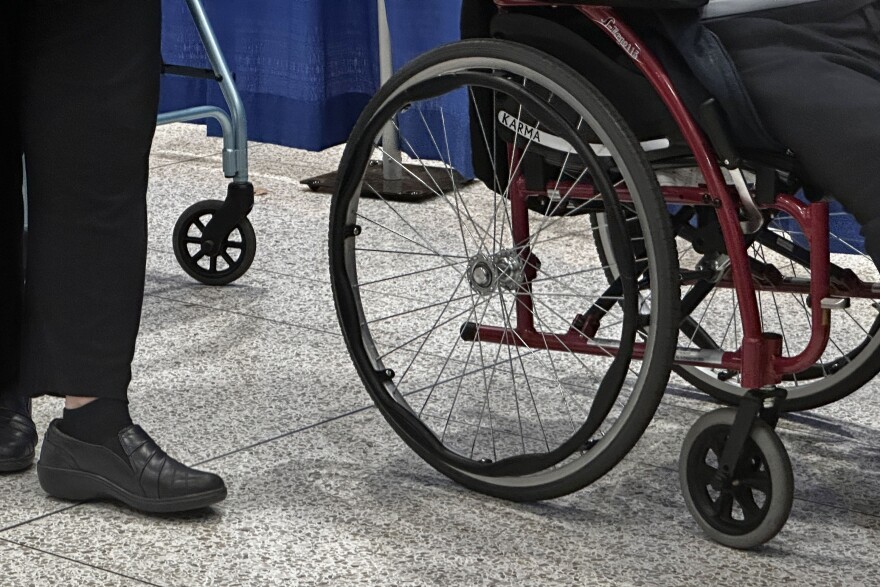Providers warn proposed cuts to Texas' Medicaid reimbursement rates could hurt medical supply companies and the patients that rely on them.
The Texas Health and Human Services Commission is proposing significant cuts to reimbursement rates for dozens of services provided through Medicaid, like ventilators and wheelchairs. Providers said during a public hearing Monday the cuts could reduce access to services or lead to closures.
Stephen Hernandez, director of operations at Angel Medical Supply in Houston, said these cuts could lead to a decrease in vital support for patients throughout Texas.
“Everybody in here is scared,” Hernandez said. “And if we're scared, imagine how the patients feel.”
Hernandez was one of dozens of providers who asked HHSC to reconsider the new rate proposals for services related to feeding tubes, mobility aids and respiratory care. Angel Medical Supply serves patients within a 100-mile radius of Houston. Hernandez said these cuts could lead to companies like his limiting what services they provide and who they can provide the services to.
“We can't be smarter than this,” he said. “There's no cutting costs. You can't cut your way out of this.”
The proposed changes would reduce reimbursement rates for some services by more than half, with some cuts reaching up to 85%. If approved, majority of the cuts would go into effect next year.
Stephen Vigorito’s son uses a feeding tube known as enteral nutrition. That service would face a cut of more than 44%.
“There are no other alternatives except for him to go on [gravity feeds]... instead of the feeding pump, which means a decreased quality of life,” Vigorito said. “It appears that there's like this calculus, like how can we reduce [medical supply company] profit enough to where they'll still stay in business but just limp along.”
Medical supply companies, also known as durable medical equipment or DME businesses connect people to devices they may need – and provide support if people have an issue with the device. For example, if a ventilator were to malfunction, they often act as service technicians.
While patients can purchase certain equipment from larger companies, many don’t offer the level of support life-sustaining devices can require.
Many providers in Monday’s hearing noted lower reimbursement rates could mean these local companies would also have to limit the maintenance services they offer.
A&P Quality Care Medical, the DME business Vigorito works with for his son, said it’s already a “battle” to remain open with the current rates.
Thomas Suniga, A&P’s director of quality control and product analysis, said these cuts could end up costing the state more in the long run by increasing the administrative burden on providers and leading to more hospitalizations.
“I get those calls at 4 o'clock in the morning from a hospital asking what's going on. We have to step in and act,” Suniga said. “We don't have time to wait around for paperwork and things like that. We have to jump in and treat patients right away.”
Suniga also said increased hospitalizations could lead to longer waiting times for everyone.
While the state is looking to cut rates as part of its biennial review, providers said reimbursement rates for DME services have remained the same for almost two decades.
“During that time, every other cost in health care – labor, fuel, delivery, insurance, equipment acquisition and compliance – has risen dramatically, especially within the last five years,” said Victoria Peterson with Respiratory and Medical Home Care in El Paso. “Providers have continued to absorb these increases because we believe in serving this patient population.”
And taking on that cost has already been too much for many companies, providers said. Peterson said her company has eliminated and reduced several services. She said continued losses could mean providers may have to stop taking Medicaid patients, further widening health disparities in the state.
Peterson also noted there’s additional stress on companies like hers as other DME companies have no choice but to close altogether. Her company, and the entire El Paso region, is still feeling the effects from when another DME company closed.
“We do not have a robust enough network of providers available to take over for companies that close,” Peterson said.
Providers from around Texas spent more than four hours urging the state to reconsider the changes – highlighting the “devastating” consequences.
“These are not optional pieces of equipment,” Peterson said. “They're keeping Texans and fragile Texas kids at home and independent. When access to these devices breaks down, the entire continuum of care will collapse.”
This post was updated on November 18 to clarify a quote from Stephen Vigorito.
Abigail Ruhman is KERA’s health reporter. Got a tip? Email Abigail at aruhman@kera.org.
KERA News is made possible through the generosity of our members. If you find this reporting valuable, consider making a tax-deductible gift today. Thank you.






